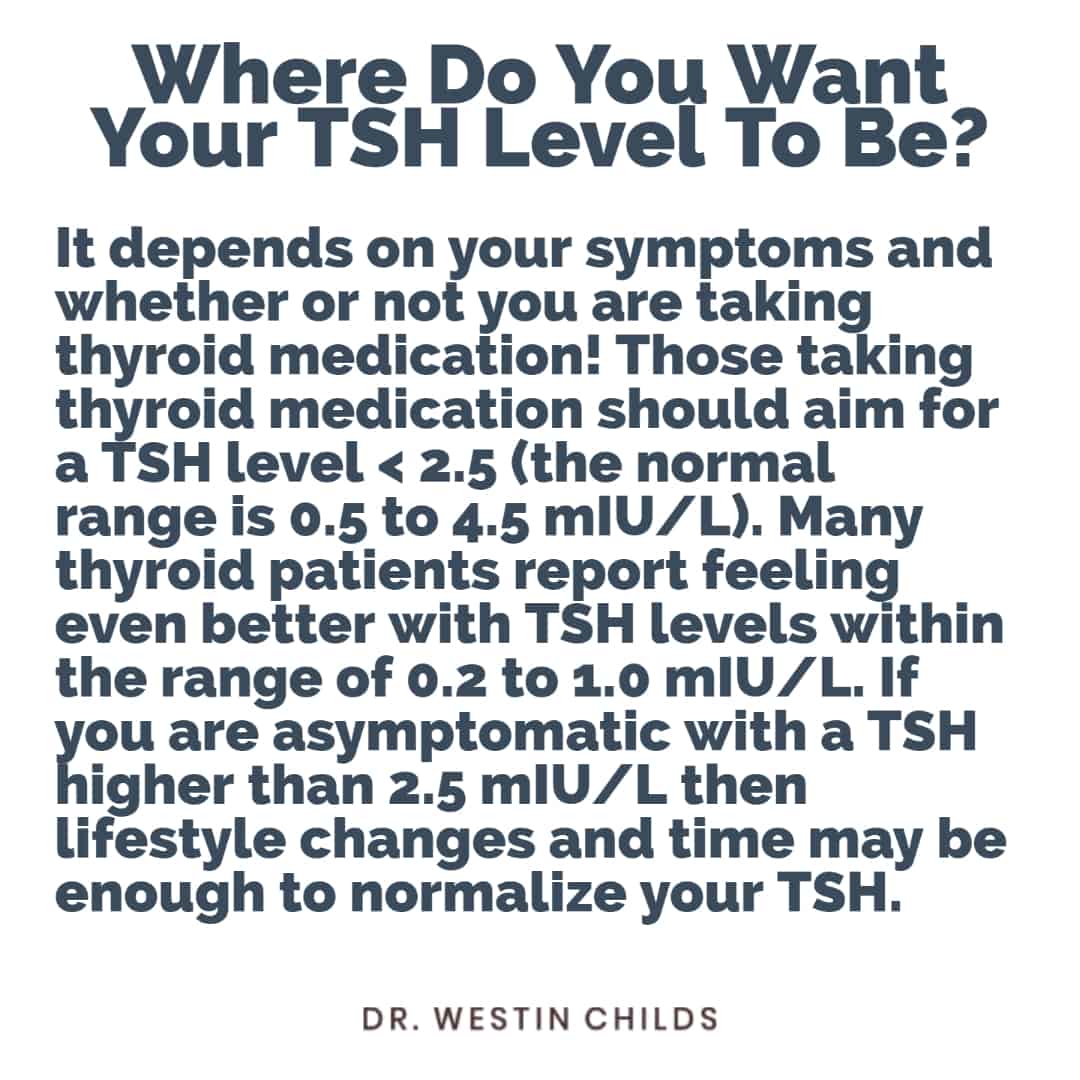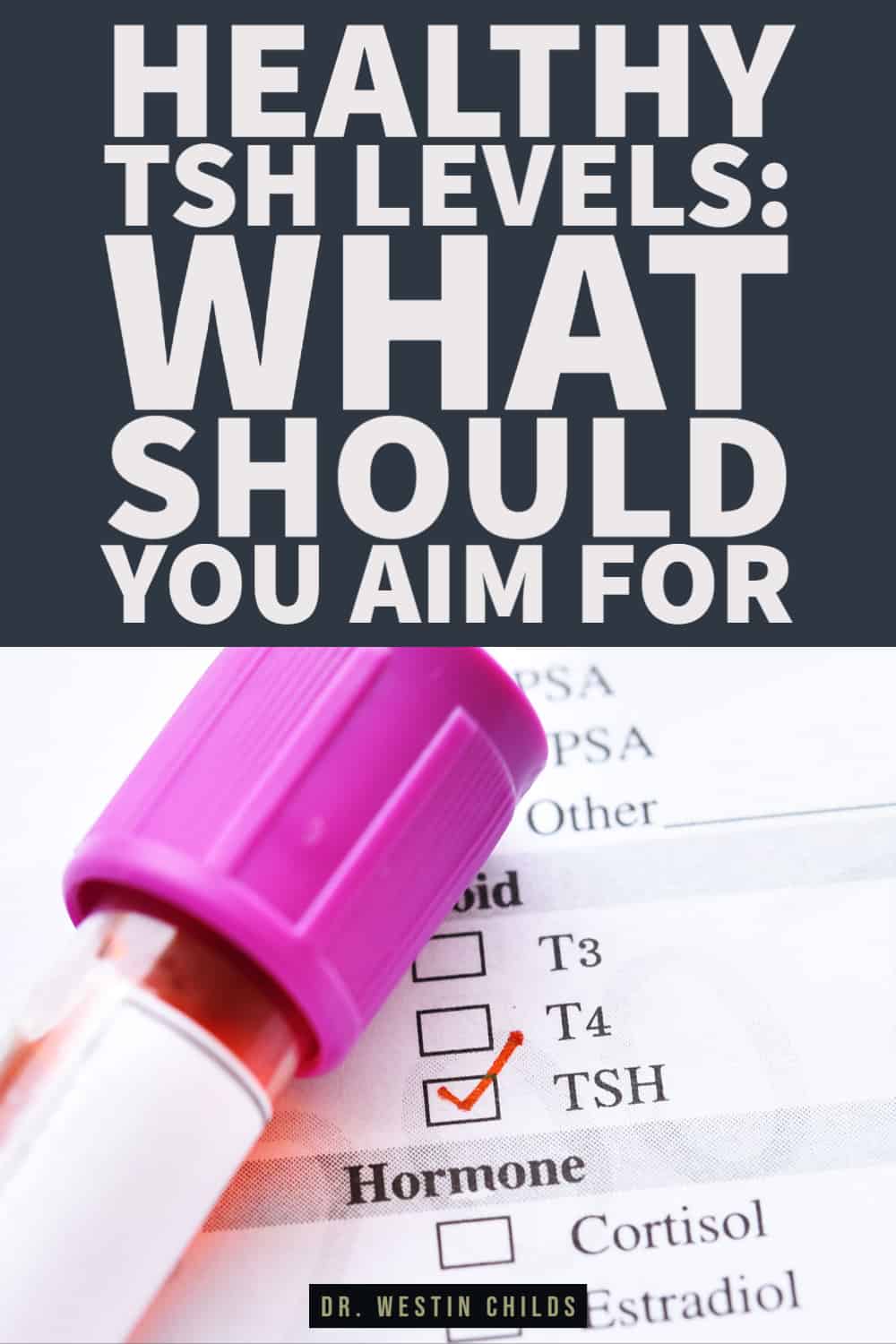Let me guess:
You just got back from a visit to your doctor after being told that your thyroid is completely “normal”.
But now you are trying to square how you can feel so poorly and have all of the symptoms of low thyroid but still have a “normal” thyroid?
Did I get close?
If so, you aren’t alone!
Patients, in general, have had similar struggles over the past several decades when trying to evaluate their TSH levels.
The short answer is that the TSH test is not as perfect as your doctor might lead you to believe.
And that’s exactly what we are going to discuss in this article.
Today you will learn:
- What a normal TSH level is.
- Why the TSH levels that your doctor is using to say you are “normal” is incorrect
- What the TSH level is actually testing for in your body
- What sort of levels you should actually “aim” for
- And what your TSH level means if you have hypothyroidism or low thyroid function
Let’s jump in…
DOWNLOAD FREE RESOURCES
Foods to Avoid if you Have Thyroid Problems:
I’ve found that these 10 foods cause the most problems for thyroid patients. Learn which foods you should avoid if you have thyroid disease of any type.
The Complete List of Thyroid Lab tests:
The list includes optimal ranges, normal ranges, and the complete list of tests you need to diagnose and manage thyroid disease correctly!
What is a “Normal” TSH Level for Healthy Adults?
Before we talk about what a “normal” TSH level is, let me briefly define what the TSH test is.
The TSH test stands for thyroid stimulating hormone which is a hormone produced in your brain by the pituitary gland.
This hormone, TSH, plays an important role in regulating your thyroid hormone.
TSH is produced by your pituitary gland which then acts directly on your thyroid gland.
It tells your thyroid gland to produce more thyroid hormone.
So if your TSH level is high, it generally means that your thyroid gland is NOT responding to the signals from your brain which means your thyroid is LOW.
If your TSH level is LOW, it generally means that your thyroid gland is producing TOO much thyroid hormone and your brain tries to adapt by REDUCING TSH levels.
Most people who assess their TSH are doing so because they believe they have LOW thyroid function.
So in these people, we are looking to see if their TSH level is high.
If you are someone who is experiencing symptoms such as weight gain, fatigue, hair loss, cold intolerance, constipation, etc. then you would be looking to see if your TSH level is HIGH as this indicates you have low thyroid function.
It can get a little confusing due to the fact that the TSH and thyroid function tend to be opposite to one another but that’s how it works.

And most people, probably you as well, get their thyroid tested to try and explain, or at least rule out, their thyroid as the cause of their symptoms.
But this is where we run into problems…
There is actually a lot of debate about what a healthy and normal TSH level actually is.
So you could go to 10 different doctors and get completely different answers depending on how educated that doctor is.
This obviously can be confusing to patients because all they want to do is feel better.
But nothing stands in the way more of them feeling better than a doctor who is not up to date with their medical knowledge.
Healthy TSH Levels VS “Standard” Lab TSH Levels
So, back to the original question:
What is a healthy TSH level?
Well, newer studies (1) that have come out show that a healthy TSH level is most likely less than 2.5 uIU/mL.
But this causes another issue…
The healthy levels I am recommending here are NOT reflected on the TSH lab reference ranges that you get on your lab report.
The “reference” range that you get on your lab report is a range of values that is pre-determined by the lab that is testing your blood.
And if your doctor isn’t very educated they may use THIS range to determine whether you are “normal” or not.
This is the last thing that you want them to do because this range differs dramatically from the healthy range that I just listed above.
The standard reference range that most lab companies produce will give you a range of values that is probably close to something like this:

You can see from the image above that the lab reference provided is under the name “REF. RANGE” and is a range of values from 0.350 – 5.500 uIU/mL.
Do you see the problem here?
The range provided is much BROADER than the healthy range that the newer medical studies I referenced above recommend.
These studies suggest that a “healthy” TSH range is probably between 0.350 – 2.500 uIU/mL.
If you are someone who has a TSH level of let’s say 3.5 then you fall within the technically “normal” range but out of the new “healthy” range.
If you fall into this range then it’s very unlikely that you will get the treatment that you need.
Because of this, you MUST understand the concept of the “healthy TSH range” and the “lab TSH reference range”.
The healthy TSH range is anything between 0.35 and 2.5 <— You WANT your TSH to be in this range.
The lab TSH reference range is much broader and ranges from 0.35 to 5.5 <– This MAY be a problem for you because of how broad the range is.
So what lab range should you actually use?
That brings me to my next point…
Use the Pregnancy TSH Levels as a Marker for What’s Healthy
This may sound a little strange but once I explain what I mean it will make a lot more sense.
Instead of using the standard reference ranges provided by your doctor, I would recommend using the pregnancy TSH reference ranges.
These ranges have been specifically created for women who are pregnant.
And I don’t care if you are a man or a 70-year-old woman, these ranges are exactly what you want to use.
Why?
Let me explain:
Pregnancy TSH levels were created because of just how important thyroid function is to the developing fetus (2).
If a developing baby is not able to get enough thyroid hormone then they have a very high risk of developmental problems including the risk of having a low IQ.
And doctors know this.
So they created much STRICTER guidelines for pregnant women when it comes to TSH (3).
They want to make sure that ALL pregnant women have ENOUGH thyroid hormone in their bodies to support their developing child.
But you can also take advantage of these reference ranges in your own body.
If the TSH levels provided to pregnant women are safe for women AND for a developing child then they are ALSO safe for you.
If you are in the medical field then you what I mean.

A doctor will NEVER recommend anything that has the smallest chance of causing problems in a pregnant woman.
Doctors even recommend staying away from MOST over-the-counter medications for this very reason.
Again, if this is recommended for a pregnant woman then you can safely assume that the levels provided are not only safe but they are INCREDIBLY safe for the reasons listed above.
So what are these TSH ranges?
They are split into trimesters and you can find the new ranges below:
- First trimester: 0.1 to 2.5 mU/L
- Second trimester: 0.2 to 3.0 mU/L
- Third trimester: 0.2 to 3.0 mU/L
Notice the difference in these ranges compared to the standard reference ranges provided on your lab tests.
The TSH levels provided above are much more narrow and more closely represent the healthy TSH level that newer studies show we should aim for.
They also allow for slightly lower levels of TSH compared to the lab reference ranges.
The low end of the reference range provided by the lab is 0.35 whereas the low end of the reference range for pregnant women is 0.1 to 0.2.
This gives you a little more leeway both on the top end and on the bottom end of the reference range.
I would recommend that regardless of your age and gender you use the reference ranges for pregnant women.
This will provide you with a HEALTHIER range for your TSH.
Interpreting your TSH based on the Reference Range
To recap, instead of looking at the standard reference range provided on your lab tests, you will want to look at a “healthy” TSH range.
The best way to create this healthy TSH reference range is to use the same ranges that doctors use for pregnant women.
The standard reference range is usually between 0.35 and 5.5.
The healthier range to compare your results to is 0.2 and 2.5.
If your TSH level is LESS than 0.2 then that would indicate that your TSH is abnormal and that you have too much thyroid in your body (a condition known as hyperthyroidism).
If your TSH is HIGHER than 2.5 then that would indicate that your TSH is abnormal and that you have too LITTLE thyroid hormone in your body (a condition known as hypothyroidism).
Again, it’s important for you to understand that your doctor will most likely NOT be aware of these newer healthier ranges that I’ve listed above.
If they are not aware of them, you can educate them by explaining what I’ve explained here which may help get them more up to date with the latest medical research.
You would probably like to think that your doctor is up to date but that just isn’t usually the case.
If you have Hypothyroidism, you can throw out these Healthy Levels
For this entire article, we’ve been talking about a healthy TSH in the setting of NOT using thyroid medication.
The healthy ranges that I’ve provided above are useful for people who have NO KNOWN diagnosis of thyroid disease.
If you are wondering if your thyroid is normal then you’d want to use those ranges.
But what about people who have KNOWN thyroid disease such as hypothyroidism or Hashimoto’s thyroiditis?
These people need a different set of guidelines due to how thyroid medication impacts TSH.
But if you are someone who falls into this category (meaning you take a thyroid medication such as levothyroxine or Synthroid) then you can still benefit from the tighter guidelines that I’ve mentioned above.
People taking thyroid medication, though, often need even tighter TSH guidelines.
TSH levels between 0.2 and 1.0 tend to be associated with better symptom control, less weight gain, improved hair growth, and better management of low thyroid symptoms in general.
There is much more to managing your TSH if you are taking thyroid medication than just this range, however, and that’s something that I will cover in another blog post.
Final Thoughts
The TSH is just ONE way to measure how well your thyroid is functioning.
Unfortunately, it’s not the best way to measure thyroid function and there are some nuances required if you want to accurately assess thyroid function in your body.
In order to ensure that your TSH is in the healthy range, I recommend using the same TSH levels that doctors recommend for pregnant women.
These levels are SAFE to use and more closely approximate what a healthy TSH would look like in a regular healthy adult.
Using these tighter reference ranges may help explain why you are feeling the way that you feel and may help diagnose MORE people with thyroid conditions who would otherwise be missed by their doctor.
Now I want to hear from you:
What is your TSH level right now?
What reference range is your doctor currently using to see if your TSH is healthy?
How does your TSH compare to the levels found in pregnant women that I’ve outlined above?
Do you feel like you are getting the treatment you need to feel better?
Leave your questions or comments below!
Scientific References
#1. https://pubmed.ncbi.nlm.nih.gov/28395379/
#2. https://pubmed.ncbi.nlm.nih.gov/21212091/
#3. https://www.medscape.com/viewarticle/752878








